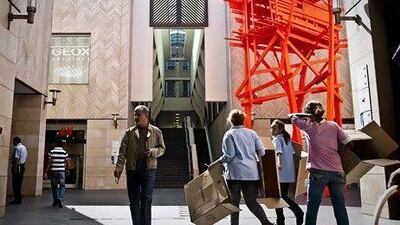Remember the moment in David Lean's Lawrence of Arabia when the Arab army reaches Damascus and ends up fighting over which tribe gets what utility? It showed us Arabs to be fractious, argumentative, unruly and uncivilised. Sadly, Lean was spot on. Some of us are all these and more, and if you want a modern equivalent, you need look no further than Lebanon, the nation that was born out of that Allied victory, and the country that would have us believe that its people are the most polished and sophisticated in the Middle East.
I asked a group of friends over dinner last week what would have happened to post-civil war Lebanon if the late former prime minister Rafik Hariri had not been born. It's a good question because I have yet to meet anyone, especially those whose default setting is to moan about Hariri's financial mismanagement, his bulldozer style or his overt Sunni politicking, who can deny that at least the man got things done.
Whether you love or loathe the result, at least Beirut has a central district that has been built according to a studied master plan to create a prosperous commercial and residential hub, one that befits a modern and forward-looking Arab capital. Hariri was the architect of that plan, and even his most ardent critics must surely concede that had he not been around, downtown Beirut would now look like Gaza on a bad day. Had those landlords who were lucky enough to figure out who owned what after 15 years of fighting been left to develop their own properties, we would have had an urban disaster.
Surely I am exaggerating. Well, in the 20 years since I returned to Lebanon, six months before Hariri rode into town, I haven't heard anyone say "we could have done it better this way". Yes, it cost a lot, but Hariri was banking on getting his money back when the Gulf came here on holiday.
The visitors did come, but we still are stuck with a debt of more than US$50 billion (Dh183.66bn). The Lebanese are still bickering over where the money went, but I'll wager that no one else could have done what Hariri did. And without his energy we'd be in a much worse position today.
To highlight my argument, one has only to look at the way in which our supposed "government of one colour" has been making a fool of itself over the latest attempt to fix Lebanon's 20-year electricity shortage. Today, the state can provide the country with only 50 to 70 per cent of the power it needs, depending on the time of year. The situation costs the government about $1bn each year and has suffocated foreign investment, hamstrung productivity and dented national morale.
The government has been further hindered by having to play catch-up to an unprecedented construction boom, increasing demand during the summer months and a grey market that has become so used to making up the government's shortfall that it has virtually become a legitimate sector in its own right.
"Wasteful" and "corrupt" is how one opposition MP described the government's latest, $26 million plan to lease two floating generators for at least two years while the state builds new power plants. Nazem Al Khoury, the environment minister and one of the cabinet picks of Michel Sleiman, the president, said the plan, which has been proposed by the Aounist energy minister Gebran Bassil, would have negative consequences for the environment, while the public works and transportation minister, Ghazi Aridi, has spoken of "ambiguous numbers in the cost and rental period" and called for new tenders.
The Aounists, unhappy with the criticism, do what they always do when their backs are against the wall, and are threatening to resign and bring down the government.
Plus ça change, as they say in Beirut.
Michael Karam is associate editor in chief of Executive, a regional business magazine in Lebanon

